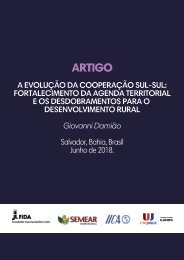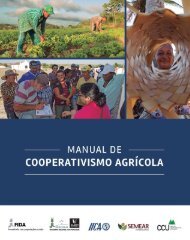The Evolution of South-South Cooperation
Since the Bandung Conference in 1955, the countries of the South have organized themselves in a structured way to achieve better levels of development. This article aims to present the evolution and recent trends of South-South Cooperation, showing how the historical dynamics have led the United Nations and its agencies to adopt a territorial approach, with a strong appeal to mobilize local actors. Allied to this, the increase of the independence of the actors that, with autonomy, manage to dialogue and conduct initiatives of cooperation outside the formal sphere of the central government. This article also aims to present rural development, agriculture and food security as essential factors for the development that since 1978, with BAPA (Buenos Aires Plan of Action), is one of the main thematic lines presented when it comes to the development of the southern agenda. Alongside this, the challenges presented by the prioritization of market dynamics in the face of social development, and how some of the multilateral agencies have worked to promote the facilitation of South-South cooperation and empowerment of minorities, in the achievement of governance as a strategy for endogenous and localized development
Since the Bandung Conference in 1955, the countries of the South have organized themselves in a structured way to achieve better levels of development. This article aims to present the evolution and recent trends of South-South Cooperation, showing how the historical dynamics have led the United Nations and its agencies to adopt a territorial approach, with a strong appeal to mobilize local actors.
Allied to this, the increase of the independence of the actors that, with autonomy, manage to dialogue and conduct initiatives of cooperation outside the formal sphere of the central government. This article also aims to present rural development, agriculture and food security as essential factors for the development that since 1978, with BAPA (Buenos Aires Plan of Action), is one of the main thematic lines presented when it comes to the development of the southern agenda. Alongside this, the challenges presented by the prioritization of market dynamics in the face of social development, and how some of the multilateral agencies have worked to promote the facilitation of South-South cooperation and empowerment of minorities, in the achievement of governance as a strategy for endogenous and localized development
You also want an ePaper? Increase the reach of your titles
YUMPU automatically turns print PDFs into web optimized ePapers that Google loves.
support to regional organizations, promotion <strong>of</strong> technical cooperation networks<br />
and the dissemination <strong>of</strong> information on innovative and best practices are some <strong>of</strong><br />
the direct means employed by the organization. 7<br />
<strong>The</strong> 2003 document also presents another trend derived from the process <strong>of</strong> the <strong>South</strong><br />
acquiring autonomy over its development. Triangular cooperation, in the context <strong>of</strong> TCDC, is the<br />
inclusion <strong>of</strong> specialized agencies, regional banks and bilateral fostering agencies in the roster <strong>of</strong><br />
actors <strong>of</strong> the said cooperation among developing countries. According to the IFAD report (2016)<br />
on <strong>South</strong>-<strong>South</strong> and Triangular <strong>Cooperation</strong>, this triangulation seeks to facilitate development by<br />
supporting initiatives undertaken by State entities; this support may be for the creation and/or<br />
strengthening <strong>of</strong> capacities (training, capacity building, etc.), the financing <strong>of</strong> development for the<br />
acquisition <strong>of</strong> tangible and intangible capital assets, or both, which will be used in accordance with<br />
the level <strong>of</strong> need, extent and degree <strong>of</strong> the problems identified by the national actors. According to<br />
the 2003 document (Revised Guidelines), developed countries should support the triangular<br />
cooperation, and this encouragement and insight cannot be purely understood as altruism and<br />
goodwill. Clear signs show that emerging economies, mainly from 2003, started to participate<br />
more actively in the global economy; thus, according to these organizations, due to the fact that<br />
emerging States are not part <strong>of</strong> a direct and equal dialogue with the North, in development<br />
initiatives, there would be the possibility <strong>of</strong> generating political imbalance in light <strong>of</strong> reduced<br />
economic barriers. Moreover, the prominence and development that some countries presented, as<br />
was the case <strong>of</strong> the Asian Tigers, could inevitably balance the power patterns southward. Aware <strong>of</strong><br />
this, Brazil includes in its political agenda two elements <strong>of</strong> fundamental importance concerning<br />
development: the first consists in territorial planning, and the second in the promotion <strong>of</strong> its<br />
international relations.<br />
From 2003 Brazil enters a new phase <strong>of</strong> its development. <strong>The</strong> Brazilian government<br />
understands the need to invest in social programs (SENRA, 2009), and the Lula administration had<br />
a major role in the advancement <strong>of</strong> these policies, which were clearly defined on its Multiannual<br />
7 For the Food and Agriculture Organization <strong>of</strong> the United Nations (FAO), TCDC is a central tool in the delivery <strong>of</strong> its<br />
services to member States. <strong>The</strong> decentralized structure <strong>of</strong> FAO reinforces and facilitates the permeation <strong>of</strong> TCDC in<br />
practically all spheres <strong>of</strong> the organization’s activities. <strong>The</strong> use <strong>of</strong> TCDC experts, intercountry consultations, training and<br />
study tours, regional and subregional workshops, support to regional organizations, promotion <strong>of</strong> technical<br />
cooperation networks and the dissemination <strong>of</strong> information on innovative and best practices are some <strong>of</strong> the direct<br />
means employed by the organization.<br />
11




